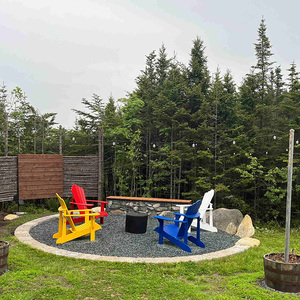Ok, here’s the deal. Most of my friends and family think I’m crazy, so maybe you guys can help deny or confirm that. I’ve spent the last 12 or so years in ‘tech’, the last 7 as a product manager but it just doesn’t satisfy me. I’m a builder, I’ve always liked building things, working with my hands and such. After much debate, I’m very certain I’d like to be either a furniture builder/cabinet maker/carpenter, and I’m quite aware of the life reset that would have to happen.
That said, how does one even become a carpenter? Besides the obvious of doing and apprenticeship and writing certification exams, how do you start? How do you actually get an apprenticeship? I assume schooling is necessary? Any guidance would be welcomed!
Thanks,
/Danny



















Replies
There have been threads on this in the past.
How old are you? What are your financial obligations? Family support? Medical insurance? Do you know the basics already?
If you answer those and more questions and have a way to pull it off, you can do it. Just be realistic physically, financially, and emotionally.
Consider weekend volunteering for Habitat. Find a mentor to work for or volunteer for who will teach you. You don't want to be slave labor but on the other hand, you can't expect prevailing wages if you don't know what you're doing yet.
If I was in your shoes, I'd consider moving to Maine and working/volunteering for Piffin or moving to Rhode Island and working/volunteering for Mike Smith. No Kidding!
Thanks
Ok so not getting the warm and fuzzy from you guys either, but thank you very much for your replies. I also have an interest in potentially being an electrician, I know the market is better for them, but I do so love to build.
I’m in my mid 30’s, no financial commitments, but no wife/family to support the transition either. I’m proficient with my tools, the only thing I’d really have to learn are the codes/regulations and such as well as proper building structures for certain situations. I do like the volunteer idea, that’s great, I will look up my local chapter immediately.
I should note that I’m in Ottawa Canada.
Take care,
/danny
Actually, becomming an electrician might be a more realistic goal for you. Around here, they have night programs which are quite reasonable. Then to get your hours in to get your journeyman's you have to work for an electrician for a certain number of hours. (Is it 6000 hrs.?)
Anyway, the good news is that you do get paid while working those hours. The bad news is that the construction business is still in the doldrums here so it wouldn't be easy to find an electrician who would take you on.
Also, I can't help but think that electrical work is a bit easier on your body than carpentry and as a result you can probably do it longer/later into your golden years. Of course Larry Haun is no spring chicken and I'll bet he can still out work lots of youngsters.
Options
Another option you might want to consider is going to your local lumber yards and asking some of salespeople there if they can give you names and numbers of a few contractors that would put you on as a carpenters helper.Pay will be relatively low until you prove your worth to the company. If you keep your eyes and ears open and your mouth closed you can learn an amazing amount of information from the right teachers. Make sure you are dependable, honest, and the hardest working guy on the crew and you'll always be busy. You can never know too much, and there are a lot of ways to educate yourself in addition to on the job training. This magazine is the best out there and there are hundreds of books to choose from. Always remember that the quality of your work is your signature and your reputation for doing great work will earn you more money where ever you go.Best of luck!
Oy! What a time to get into it!
This guy has an interesting story:
http://www.thomasjmacdonald.com/abouttommy.php
I've seen a couple of epsiodes and it's a great show.
My neighbor is a carpenter (framer) & deck builder and he's extremely broke to the point that I think he may be losing his house. This is in Metro Atlanta, btw. He hasn't had steady work since '08 and before that he was making a good living. But, as he aged (late 40s) he's slowed down and had a couple of heart attacks. So, there are a couple of factors relating to his problems - then again, I've been hearing the same story from younger healthy guys.
On the other hand, an affluent woman I volunteer with just had her kitchen redone with all custom cabinets.
My point? There are carpenters still making a living but I don't think it's in new construction: framing, decks, etc.... AND it also depends on your area. We've been really hit hard here - the building wan't a boom here; it was more of an explosion.
Really do your homework - life reset, indeed!
Find your local union either in the phone book, or online, and ask about their apprentice program. They typically have written tests, and interviews, as part of the application process. It is then a combination of classes, and on the job experience to get to the journeyman level.
The other option is local community college programs. Some areas have excellent building trades programs, and since the core classes tend to be the same, such as blueprint reading, you could take the intro classes before deciding on which trade you want to do.
The third option, depending on your educational background, look at getting a degree in construction management, construction engineering, civil engineering, or architecture. Not as hands on, but alot easier on your body, and satisfying in their own way. It's kind of nice to define a problem, figure out a cost effective solution, put together a set of plans and specifications, and see it come together. Particularly, when it's done on time and within budget.
Fourth option is to start reading a bunch of stuff from Fine Homebuilding, the online membership is a good bargain, and I do that instead of subscribing to the paper version. With the online version you can read the current issues, and search the back issues for articles that interest you. If you find something that interests you read up more on it by getting some of their books. (I usually donate them to the library after I read them, and take a tax write off.) While you will still need to get some real work experience before your a good hand, the learning curve will be shorter, and your work quality will be better than a lot of the guys I've seen in the trades who learned on the job.
If you want to learn the code, buy a copy of the code with the commentary, and the accompnaying study guide. I highly recommend that anyone who buys a copy of the building codes buys the version withthe commentary. I've won quite a few arguments with inspectors, because I could take them to my commented version of the code book, and have them read what the committee that wrote the book was trying to accomplish. It really helps to eliminate misinterpratations of the code. In your case it would help to broaden your knowledge faster than years of experience.
If you have enough tools and shop space, you could start as a part-time, moonlighting project. You mentioned cabinet building and furniture making. Those could be started as a weekends and evenings business. That might give you the ability to keep your day job and give this a try. Then you would know if you would love it and want to go full time or if you want to keep it as a side-line. If you don't have much experience yet, you could try get a few jobs for friends who are remodelling a bathroom and give them a heck of a deal (materials and a small amount for labor) so you can use their projects as your learning experiences. That way when you get a bigger project for a "real customer" you will give them a great product and can start building a reputation.
I have a friend who builds log furniture, and he does it as a sideline to his job at the local fertilizer plant. He loves doing it, but has decided that it is better for him to have a job with medical insurance and build furniture 15-20 hours in the evenings and weekends for a little extra money and a place to express his need to build things. Furniture and cabinets also aren't subject to as many codes and permit issues when compared to carpenters, electricians, etc. As a sideline, he keeps busy enough through word of mouth advertising and relationships with a couple of general contractors (log home specialists) who give him referrals. Since he had the tools he needed and had a shop already, his initial investment was pretty low.
He did get himself set up as an independent contractor, got licensed and bonded and took out an insurance policy for his business. That would be the scariest part of doing this as a sideline is if something happened and you lost everything to a liability issue. Be sure to get yourself protected.
I don't know about you Jim......
but I'm still trying. Those damn sub-trades are pretty deep.
one of these days.
Hi B.C.
Yeah, it seems the farther I go the more there is to learn. Always a different technique to try, or standard to strive for.
Just once I'd like to complete a project and not think "well, that will have to do".
But maybe that's exactly what has held my interest, challenged me all these years. In many ways I feel fortunate to have found carpentry as young as I did. Just hope I have enough time left to build something I'm proud of. I get opportunities, and I think I'm getting closer...maybe I'll get to build something for one of my children, that would be great, huh?
Building something for the children........
now that would be rewarding.
Spent much of the weekend down in Nashville-repairing for the children. Felt good even if it's not way up there on the re-ward-o meter.
Fun goof'n with the grandson. We borrowed a couple of days of MLB.com daily telecast on the TV and watched the Tribe sweep the Orioles. Man, had him speaking the jingo and you should have seen him with the broom on Sunday aftn!
So as not to warp the boy, we watched some NHL playoffs action last nite. Something to do on a rainy / cold day-of which we had a couple. Finally yesterday the sun came out and it got well over 50. Jeez, drive 7 hours south and the weather was like what we left here.
But, they have flowers.
and leaves.
so yeah, don't know it all and probably never will, but can make a good attempt at playing the part.
We've all got to get together again and break some bread. Whadya say?
COOL!
We're already marking it on the calendar, lessee.................Summer 2012.
Ok, got it.
Our start nobody could have come up with this senario. It's always something, but not this. Admittedly I did say b/4 the first pitch in the sun at the opener = "wait till next year".
No matter what, it's always fun to be in contention. We hope it continues.
I emailed Holly as they sure had some weather there this past weekend. Those two would be fun to pester.
"How to become a carpenter?"
Do it as a hobby, not a 'career'.
I've spent nearly thirty years practically killing myself trying to make a living as a residential framer, commercial sheetrocker, finish carpentry specialist, and finally as a self unemployed residential remodeler. I've worked every aspect of residential carpentry, both new build and remodel. Union, non-union, as an employee and self employed. One constant has plagued me all these years. The work is extremely subject to the boom and bust cycles of the economy. Construction always leads the way into and out of a recession. You either have a ton of work backed up, and people are mad becuase you can't do their job yesterday, or you starve and worry for months when it all dries up.
My dad was a machinist (tool and die maker) who enjoyed carpentry as a hobby. He was thrilled when I decided to make carpentry my profession. Since he enjoyed it so much as a hobby he assumed I'd be happy doing it 'for a living'.
Ha !
Few days go by where I DON'T regret choosing this career path. Spotty pay. Work outdoors in the worst weather. Work for cheap, arrogant people who know the price of everything, and the value of nothing. Physical aches and pains. Constant financial insecurity. Lack of respect from those who have no idea how to build the things you do, yet are sure you're an idiot because "you work with your hands". (I wonder if they can cope and miter prefinished, stain grade crown molding. WITHOUT a tube of caulking ?)
Better to become a plumber or an electrician; two trades that are constantly in demand. (Homeowners are scared to death to do either, for fear of either flooding or burning down their home.) According to the big box stores and glossy magazines aimed at Joe Homeowner, "Carpentry is a "perfect DIY project!", since "anyone can pound nails. IT'S EASY !"
Don't do it, kid. Keep your real job. Carpentry is best enjoyed in moderation, like a hobby.
Do it as a hobby, not a 'career'.
Thread resurrected, but good advice that, eh?.
OP is in CND, so dont know the laws or taxes etc. there, but in the USA building your own home (doing it all yourself, not subcontracting) is one of the best financial deals (unless unions have co-opted local ordanances to prohibit) . In USA, you build a house, live in it for 2 years, what you sell it for is tax free!
Land pricing is a separate and very local issue, but as for the house itself, if you have the tools already, you can spend about $40K on building (plus $5k for just the permits) and sell it for close to $200K above what the lot cost even in these down RE times.
Of course, you MUST have very strict financial discipline.
Mid 30s age the OP may be getting too old to work 18 hour days though<G> (assuming the day job is retained to finace material purchases)
I don't know........
I've thought like you on occasion, but not any more.
I've been in the trade since '72, done like you in the beginning-repair, framed houses, commercial remodels, union framing and hanging, back to residential and for the last 22 yrs, my own operation-residential remodeling.
I've built a good customer base and work referral only which has weeded out those tire kickers-my BIL can do it's...........
I'm more satisfied now than 20 yrs ago. I'd recommend it as a career, but would advise learning the trade AND business. They are not the same. You'll go broke easy as a good carpenter with no business training.
ONE APPROACH THAT WORKED IN ONE EXAMPLE
There are hundreds of small jobs around that people have trouble getting done - contractors get tied up on bigger jobs. If you find a couple of these and show up like you say you will/ and do them right/ you will probably get referred to 2 or 3 of their friends for more small jobs - plus get a bigger job from them. Business will increase exponentially.
Just do one job at a time, don't pull off a job until you get it done. Do whatever they want done if you can handle it before you leave. Don't tell the next one you're coming until you get this one done. Buy tools as you need them for each job. Ask ahead if you can get paid when the job is done - or the end of each week if that applies.
View your low profits and tool-purchases as school tuition. Small jobs aren't real profitable because of all the time gaps, but they are instructive.
Get counsel for questions that come up from a contractor friend, you tube, Break time, books or whatever - and thus stay out of trouble.
Give this 3 - 4 years and you could have a year round business off the ground. Give it 30 years and there's still plenty to learn. If you enjoy it as you say - you'll have plenty to enjoy.
construction
I was in the same spot as you when i was 32 years ago but had a wife in the fed gvt
I was assistant plant manager for a US firm in ottawa
Offered plant managers job if i stuck it out in move to plant in TO area
I quit instead when a older guy at one of our plants in New Jersey told me noone ever retired at 55 because they went out feet first ( & the plant manager there had offered me a job there in management )
I bought a old school house in the country & rebuilt it which ended up started me in my own business due to local demand
One of the things i looked at when i started into professional trades work was how many guys had grey hair ( no grey hair no future )
Also as a jack of all trades i got all a customers work not just a bit of it
AS a jack of all trades you can build or renovate your own home & it also becomes your display of your work
IF you work for a smaller operator you usually get less money but more all around experience vs a larger operator who tends to want you to master one trade only for better money
Algonquin has some good programsfortunately
I origionally lived in Ottawa South for 32 yrs before i moved to the country and bought my home when it was the first & last from the corner now its the first & has 28-30 after it ( my fault )
One thing about being self employed youll never be bored if thats the way you wish to go!